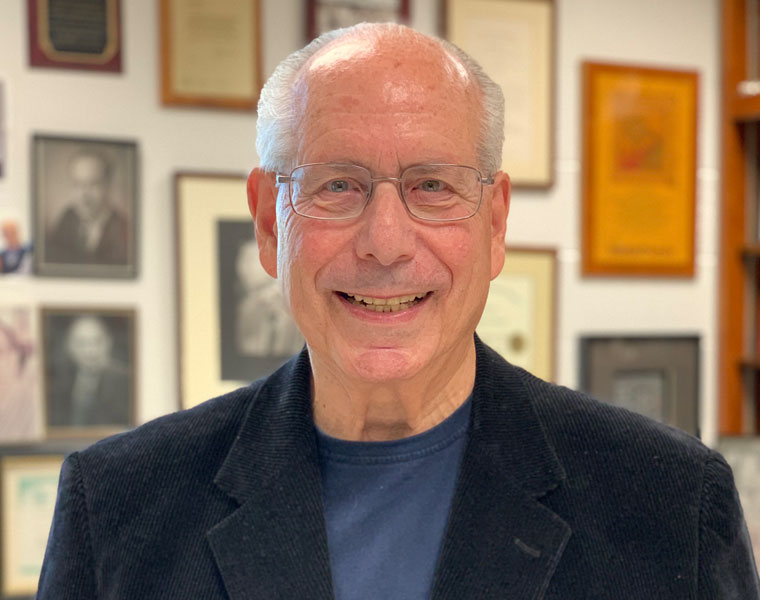The Case Western Reserve University community is mourning the loss of Arnold Caplan, professor of biology at the College of Arts and Sciences and founding director of the university’s Skeletal Research Center. He was 82.
A distinguished scientist, Caplan left an indelible mark on the field of regenerative medicine during an illustrious career spanning over five decades. He was the first to discover and describe mesenchymal stem cells (MSCs), which became the basis for the success of virtually all regenerative therapies. Additionally, he published more than 400 studies relating to regenerative medicine and was one of the most highly regarded scientists in the field.
Caplan came to Case Western Reserve as an assistant professor of biology in 1969, and rose through the ranks to become a professor in 1981. By 1987, Caplan walked into the office of Stan Gerson, now dean of the School of Medicine, with an idea.
“[Arnie] asked me to draw on the blackboard the hematopoietic stem cells and label all of the lineage,” Gerson explained. “He then erased all the names and put in place the mesenchymal stem cell lineage, and thus it was born.
“What we learned since has been absolutely remarkable,” Gerson continued. “One of my patients is still alive today having severe graft-versus-host disease—treated with mesenchymal stem cells as a cure. Arnie’s efforts across the world have been incredible, and his linkage with every conceivable individual interested in stem cells, mesenchymal stem cells, and potential for cell therapy, has simply been [extraordinary]. We will miss him daily.”
Forging his legacy
Caplan, who also held secondary appointments at Case School of Engineering and the School of Medicine, was long supported by the National Institutes of Health and other nonprofit and for-profit agencies for his efforts to understand the development, maturation and aging of cartilage, bone and skin and other mesenchymal tissues, and for his pioneering research.
A pivotal moment in his career came when he isolated human MSCs from adult bone marrow, establishing the conceptual and technical foundation for subsequent global studies. In 1992, he founded Osiris Therapeutics, Inc., commercializing the technology, which later led to numerous clinical trials worldwide.
Recognized as the father of both basic science and clinical therapeutics of adult MSCs, Caplan discovered the innate ability of MSCs to modulate the immune system; to inhibit both programmed cell death and scar formation; to stimulate blood-vessel formation; and to promote the growth of tissue-specific stem cells. His work has impacted studies and treatment of human diseases ranging from multiple sclerosis and osteoarthritis to spinal cord injuries and cancer.
“Arnold was a gifted scientist and brilliant researcher who had a remarkable career,” said Joy K. Ward, provost and executive vice president at Case Western Reserve. “His contributions to the field of regenerative medicine are recognized globally. Even more importantly, however, he was a remarkable mentor to his many successful students.
“His gifts will most certainly be passed down to scholars and scientists who succeed him for years to come,” Ward added. “Arnold will be greatly missed and his impact will live on through the many people that he supported through his research and mentoring.”
A commitment to student success
In his 54 years at CWRU, Caplan built a strong reputation for his commitment to mentoring students. A prime example: For 22 years, he held an annual three-day course through which eminent researchers in regenerative medicine and stem cell technology gave lectures on cell-based therapies and tissue engineering.
Just as important, research associates and assistants in Caplan’s lab provided hands-on training to graduate students, postdocs and junior faculty from around the world, teaching them how to isolate and manipulate MSCs from bone marrow, according to Lee Thompson, interim dean of the College of Arts and Sciences.
“After every meeting I had with Arnold, after we covered what I had on my agenda, it became clear that he also had an agenda, which always included genuine words of encouragement and wisdom for me and asking for my assistance with mentoring or helping a colleague, student, or post-doc,” Thompson recalled. “He was always looking out for those around him and their best interests.”
Caplan’s warmth and mentorship touched the lives of countless others he trained—shaping the careers of over 150 researchers with his intellect and guidance. He was honored with numerous national and international awards throughout his career, including five lifetime achievement awards and, most recently, a 2022 Faculty Distinguished Research Award.
Beyond the laboratory, Arnold was a devoted husband, father, grandfather, and friend, creating a legacy that extends far beyond scientific achievements. His love for cooking, walks, and deep, meaningful conversations (which often became debates) will be missed by many.
Caplan is survived by his wife of 58 years, Bonnie; two children, Aaron (Tami) Caplan and Rachel (David) Uram; six grandchildren, Josh, Andrew and Brian Caplan, and Lyla, Sam, and Bella Uram; and brother, Herbert (Barbara) Caplan.
A service and private interment were held Jan. 14 at Park Synagogue in Pepper Pike. The family will receive friends at Aaron and Tami Caplan’s residence (25455 Letchworth Road in Beachwood) from 2 to 4 p.m. and 6:30 to 8:30 p.m. Jan 17.
Donations in memory of Caplan may be made to The Greater Cleveland Food Bank, Planned Parenthood of Ohio and Rise Up: Northeast Ohio (a science education nonprofit).
Students who would like support during this time are encouraged to contact University Health and Counseling Services at 216.368.5872. This line is staffed by a counselor 24 hours a day, seven days a week. Faculty and staff can access counseling at any time by calling IMPACT Solutions at 1.800.227.6007.

